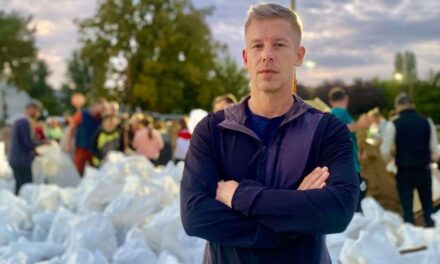He follows me into the lake - gypsies, drugs, an ax handle. Written by István Forgács.
The current drug situation makes any social and economic catch-up impossible, the action against drugs must be put on a completely new basis, especially in the gypsy settlements.
Forced political correctness is mostly the internal, forced self-justification of weak and lying societies on all issues that neither the state nor general opinion makers dare to speak honestly about. Society is muzzled so that it can only grumble to itself if possible, if at all. Forced political correctness is therefore also a kind of self-censorship, a specific suppression of freedom of speech, which covers up the entire reality, showing only a part of it, just as much as the zeitgeist deems polite. That is, the zeitgeist defined by the "European" and the Western world (woke and other movements).
An important question in this situation is how open we Hungarians are to meaningful debate. How brave are we to not look away when life throws unpleasant and even dangerous phenomena into our field of vision? For example, the fate of the nearly one million Hungarian Gypsies, the internal threats arising from the dynamics of the community, and what these have in store for those who live with them and for society as a whole. It is obvious that giving up self-censorship can never involve blood-sucking gypsies, putting exclusion into words, but it can bring fresh air to stale public discourse.
As a result of the government's help, self-respecting gypsies motivated by many changes have come forward in recent years. Since 2010, many more Gypsies have been able to enter the primary labor market than before, they have been able to provide themselves with better conditions, and there have even been quite a few who have become the clear winners of the government's family support measures.
However, it must also be said that there are still many people who do not understand the value of the above state subsidies and catch-up achievements,
they don't want to use them, and they practically squander all the care, all the resources and opportunities offered by the state and the decent majority through the state. They are serious obstacles not only to the development of the Hungarian economy, but also to its sustainability. Among them, unfortunately, there are still many Gypsy people who are either swallowed up by their own environment, or who themselves stifle their chances of integration. The result of things is of course multifaceted, sociologists could list for days what and why, from Kemény to Ferge, classic statements could be made one after the other, but due to the current forced political correctness, unfortunately we will not be much ahead with these.
There's a drug situation
Let's say it boldly, there has been a drug situation to be interpreted in connection with the Gypsies for decades. Although the government was right to believe that the shift towards a work-based society and the strengthening of the Gypsies in the labor market would reverse the decadence in the Gypsy communities, this was only partly the case. Covid restrained the achievements and achievements of the gypsies who wanted to change, and although they are still in a much better position than before 2010, the momentum has noticeably stalled in many places.
The biggest obstacle to moving forward is the drug situation, which used to exist around the gypsy settlements and gypsy communities, but at the moment it is almost at its peak.
in which, in addition to demographic reasons, the fact that strict and law-and-order drug regulation is still taboo plays a part. It indicates a state of split consciousness, that while the vast majority of society demands much stricter state action in relation to all drug-related crimes, there is continuous whining, complaining and relativization as soon as a well-known person is brought forward for a drug-related violation. The madness of legalizing certain drugs is on the agenda again and again in the parliament and in the public discourse. In other words, regarding the Zákány child murder, thousands of armchair commentators demand the reinstatement of the death penalty, and then they call for a police state if there will be drug tests in secondary schools.
Anyone who deals with social integration knows that it is not compulsory school attendance until the age of 16 that hinders Gypsies and their social integration, but the cheap drug that Gypsies distribute and consume in many Gypsy communities, and thus turn it upside down. your own narrower and wider environment. Practically forever. Gypsies and non-gypsies together.
Demography is an evil and cruel thing: in many regions of the country, the number and proportion of Gypsy children continues to increase, with which the number of those at risk increases proportionally. Part of the danger of the drug is that it offers illegal income to many, as well as the fact that it has a damaging effect on health. However, the biggest social danger lies in the fact that drug users in rural settlements know neither man nor God after a while when it comes to acquiring money or assets that can be turned into money. The result of which is the continuous increase in the number of crimes against property, as well as the fact that these people are acting more and more brutally. The motive for many murders and serious assaults is the acquisition of suspected property values, unfortunately in many cases by very young perpetrators. In the same way, road accidents committed under the influence of drugs (also largely by young people) are a real threat, and the number of cases committed under the influence of drugs, in many cases to the detriment of minors (children), is also increasing in the category of relationship and domestic violence. And disorder is a very euphemistic wording for drug-addled youths walking around with samurai swords in the main square of a small town of 30,000 and threatening peaceful passers-by and families with small children.
A summary statement, but true:
the processes and events listed above are appearing in increasing numbers in or around Gypsy communities. I am convinced that instead of more permissive regulation, Hungary should move towards stricter strictures. It is not possible to effectively spend hundreds of billions on social catch-up (meaning: effective social catch-up of the Gypsies) while losing the battle against drugs.
Some opinion makers react in the same way to cheap drugs as they do to domestic violence: responsibility is spread across society as a whole. According to them, the chief doctor in Rózsadombi also beats his wife, not only the public worker in Szabolcs; They also do drugs in Pasaret, not only in the Kunhegyes district. According to the fact checkers, this is exactly the case, and I can't dispute that either. The problem is with the weight and absolute value of things. Relationship violence is much more obvious in gypsy settlements than in the upper middle class, and the same applies to drugs. In other words, putting forced political correctness aside, we must boldly say: if relationship violence and drugs demand immediate intervention somewhere, then it is certainly in many gypsy communities. Because there it spreads, there it rampages, there it forever takes away tomorrow not only from those who live there, but also from their environment, and in the longer term from the entire Hungarian society and economy.
What is the solution?
The creation of stricter laws than ever before and their effective application. Here are some points to consider:
recruitment of potential police officers from underprivileged/Roma communities . A separate police unit/body should be established, which only deals with crimes that occur together with drug distribution and drug consumption.
"ghetto drug" and "colony drug" must appear in public opinion . Everyone should finally understand that, in contrast to expensive and elite drugs, cheap drugs are just around the corner, and many more people are vulnerable to them than we think.
• The institution of settlement/community detention - i.e. the detailed development and introduction of the strictest secondary punishment as soon as possible. This measure aims to prevent the convicted person from returning to their former place of residence for 12 to 36 months (apart from certain benefits) as a secondary punishment for any final drug-related court verdict. The goal is to expel the given person/persons from a community or settlement where they previously posed a direct threat to local residents. The tightening serves two purposes: on the one hand, it already represents a serious deterrent, and on the other hand, after a while, it offers a chance to clean up drug-affected settlements. (The tightening still has a legal basis at the moment: keeping away is a legal instrument that can still be ordered between individuals. Here, too, we are talking about the aspect between individuals, where there is one or a few individuals on one side, and a community on the other side.)
• Presentation of the concept of drug-free settlements or drug-free communities . This proposal aims to promote that all those settlements and communities in which drug use has ceased or is at a minimal level, or where no drug-related crimes occur, receive a kind of recognition of excellence, thereby increasing the esteem, value, and social recognition of the settlement. The proposal would encourage all those settlements and communities that are currently suffering from a bad perception of drugs to start programs that can help change this. This can also promote a kind of local social cohesion.
• Development of the concept of drug amnesty at the local level People whose everyday lives - as an active participant or as an intermediary affected - are interwoven with drug-related crimes, could be given a grace period, during which they could account for the dangerous circumstances that they now face, indirectly or directly, of their own volition or due to coercion from the family its victims. This period can be 6-12-18 months, and its purpose is to give escape time to all those who want to get out.
• Bearing collective responsibility. Legislation should be tightened to ensure that drug-related assets and financial assets cannot be "leaked" from the environment of the persons subject to the procedure. That is, if assets are listed even in the name of a family member, they should be able to be seized. Even if they do not commit anything, it is hard to believe that they do not know about the origin of the high-value assets or money that comes into their possession. This measure is also in line with society's sense of justice: it frustrates many people that lenient sentences are handed down, that assets acquired in connection with drugs remain and can be saved.
to appoint a government commissioner responsible for drug control and anti-drug action , who would be responsible for the development and effective application of the above measures.
In different forms, many professionals (including myself) are investigating the possibility of how to deal more effectively with drugs in and around gypsy settlements. A successful breakthrough requires a social debate that is also open to radical approaches. The concept outlined here is also like this. Because we have common issues where there is no place for tolerance. The drug is clearly like that.
Featured image: IStock












